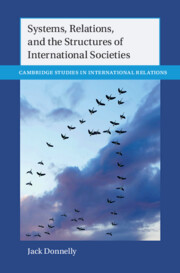Book contents
- Systems, Relations, and the Structures of International Societies
- Cambridge Studies in International Relations
- Systems, Relations, and the Structures of International Societies
- Copyright page
- Contents
- Figures
- Tables
- Acknowledgments
- Part I Systems, Relations, Levels, and Explanations
- Part II Waltzian Structural Theory
- 5 Structural Theory
- 6 Anarchy
- 7 The Tripartite Conception of Structure
- 8 Functional Differentiation and Distribution of Capabilities
- 9 Ordering Principles
- Part III Systems, Relations, and Processes
- References
- Index
- Cambridge Studies in International Relations
6 - Anarchy
from Part II - Waltzian Structural Theory
Published online by Cambridge University Press: 19 October 2023
- Systems, Relations, and the Structures of International Societies
- Cambridge Studies in International Relations
- Systems, Relations, and the Structures of International Societies
- Copyright page
- Contents
- Figures
- Tables
- Acknowledgments
- Part I Systems, Relations, Levels, and Explanations
- Part II Waltzian Structural Theory
- 5 Structural Theory
- 6 Anarchy
- 7 The Tripartite Conception of Structure
- 8 Functional Differentiation and Distribution of Capabilities
- 9 Ordering Principles
- Part III Systems, Relations, and Processes
- References
- Index
- Cambridge Studies in International Relations
Summary
In sharp contrast to dominant (Waltzian) understandings in contemporary IR, I argue that anarchy neither is an ordering principle nor has determinate effects – and therefore is not central to the structures of international societies. Anarchy, understood as the absence of a government, is not an ordering principle. (It tells us one way in which a system is not ordered.) Understood as the absence of hierarchy, anarchy is not the ordering principle of international systems. (For example, great power states systems are defined by the hierarchical superiority of states over nonstate actors and of great powers over lesser powers.) Furthermore, the absence of a government has no determinate effects (which I show both by identifying a wide range of consequences of the absence of a government and by looking at the empirical case of simple immediate-return hunter-gatherer societies). I also show that framing the absence of an international government as anarchy, and making anarchy a core concept in IR, is largely attributable to the impact of Waltz’s Theory of International Politics (1979).
Keywords
Information
- Type
- Chapter
- Information
- Publisher: Cambridge University PressPrint publication year: 2023
